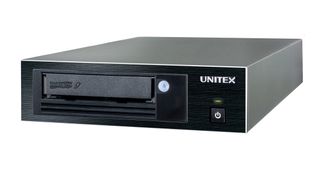This superfast USB tape drive could make cloud backup a thing of the past for you
Tape-backup-as-a-service could become a thing for businesses

Japanese tape drive vendor Unitex has unveiled the first ever LTO-9 tape drive with a USB connection.
The aptly named UNITEX USB LTO-9 drive offers a native capacity of 18TB on one tape with transfer rates of up to 300MBps, far more than any cloud backup or cloud storage service could ever reach. The inclusion of a USB port, albeit a Type-A 3.0 model, means it has near universal compatibility, either by default or by using appropriate converters.
The device is a follow-up of the LT80H, an LTO-8 USB tabletop drive, and is likely to be sold at a significant premium; the LT80H costs $5,100 and the LTO version will probably reach $6,000. On the flip side, LTO-9 tapes are reasonably priced at less than $170, which is about half what an equivalent 18TB hard disk drive costs.
A spokesperson for Unitex confirmed that pricing is yet to be finalized. Interestingly, they also mentioned the company's tape-backup-as-a-service offering, which already exists in Japan. “We are studying to expand the service to global customers at the moment,” the spokesperson added.
A potent cloud storage alternative
Hardware-as-a-service is picking up steam in the creative industry, which generates enormous amounts of data, much of which needs backing up. For example, US-based OWC (a rival to Unitex) has introduced a scheme called Fast Forward that allows users to rent hardware for a fixed monthly fee.
Backing up to tape is one or more orders of magnitude faster than uploading to the cloud, especially for smaller outfits that do not have the setup to keep terabytes of data in a safe place. Backing up 18TB of data over USB would take about 17 hours, but far, far longer over broadband, plus tape offers a physical air gap that mitigates the risk of ransomware attacks.
The ability to rent an LTO-9 tape drive for a short period of time, every month, cannot therefore be overlooked. As a medium, tape is also more resilient, easier to store, takes up less space than hard drives and has a lower environmental impact on a per TB backed up, making it a useful component of any 3-2-1 backup strategy.
Are you a pro? Subscribe to our newsletter
Sign up to the TechRadar Pro newsletter to get all the top news, opinion, features and guidance your business needs to succeed!
- Here's the best external hard disks around

Désiré has been musing and writing about technology during a career spanning four decades. He dabbled in website builders and web hosting when DHTML and frames were in vogue and started narrating about the impact of technology on society just before the start of the Y2K hysteria at the turn of the last millennium.
Most Popular




